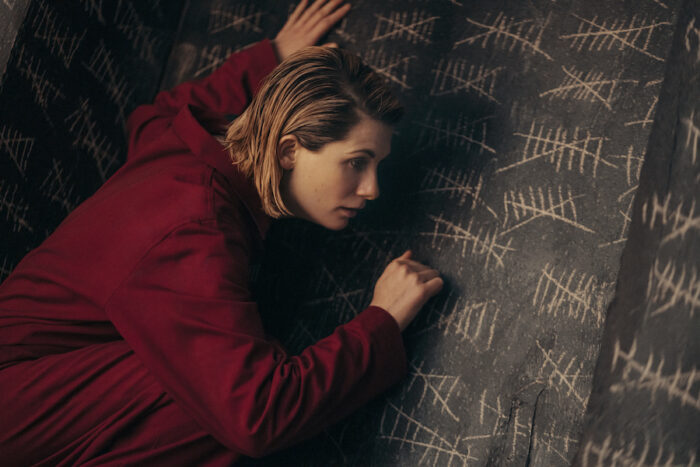UK TV review: Doctor Who: Revolution of the Daleks
Review Overview
Revolution
5Turnaround
6Inner circle
7Mark Harrison | On 05, Jan 2021
This review contains no spoilers for the feature-length New Year’s special but mentions plot details from the last two Jodie Whittaker series. If you’ve already seen the episode, read on after the review for our additional spoilery observations.
“Being with the Doctor you don’t get to choose when it stops. Whether you leave her, or she leaves you.”
Following last year’s lore-heavy season finale for Jodie Whittaker’s Thirteenth Doctor, there’s a belt-and-braces approach to Doctor Who’s 2021 New Year special Resolution of the Daleks, doubling the return of the series’ headline monsters with the long-promised return of Eccleston/Tennant-era companion Captain Jack Harkness (John Barrowman).
In Season 12’s traditional “What? What? What?” cliffhanger, the Doctor was incarcerated in space jail for several life sentences, unbeknownst to her companions, who had already been safely sent home to Sheffield. Ten months later, Yaz, (Mandip Gill) Ryan, (Tosin Cole) and Graham (Bradley Walsh) all have different feelings about being left behind. However, when the government unveils new “defence drones” that look suspiciously like the Dalek they helped to nobble two New Years ago, the fam spring back into action.
For this 70-minute outing, head writer Chris Chibnall serves up a direct sequel to his previous New Year special, Resolution, with a marquee blockbuster that follows the 1980s naming scheme, eg. Resurrection/Revelation/Remembrance of the Daleks. It’s much more of a traditional Dalek outing to boot but, as befits New Year, it’s also a bit of a hangover.
Processing both the indulgences of Season 12 (I sympathised with the Doctor stewing in her cell over how disappointing the events of that episode were) and the lingering events of Barrowman’s earlier guest appearances (surprise cameo in Fugitive of the Judoon notwithstanding), this special has a lot on its plate. With its extended runtime, Chibnall alternates between making a meal of it and wolfing it down, and the result feels slow and yet rushed all at once.
Barrowman is evidently delighted to be back and there’s nothing wrong with his performance, but the episode strangely struggles to find a reason for him to be there. With a pre-publicised companion departure in the offing, the marketing seemed to suggest he’ll act as a more recent version of “the Doctor’s ex” that Sarah Jane Smith represented in earlier series but, in the episode, it feels as if his conversation about life after the TARDIS is with the wrong character.
The special missteps in similar ways throughout the action, not least in how Jack’s comeback is somewhat undercut by everything else that’s going on. It should go without saying by now that those in the Doctor’s inner circle are on strong form, with Gill particularly benefiting from some increased agency and Cole and Walsh comfortable enough in their roles as all-rounders for both funny and melancholic moments. Whittaker also finds new dimensions in her exuberant Doctor while in isolation, without the other regulars to bounce off – even if the impending crisis should tell you she won’t be behind bars by the time the credits roll.
As to the other big returnees, the Daleks trundle through some familiar plots with a new design, which speaks to their origin as a patent of returning antagonist Jack Robertson (Chris Noth) from Season 11’s Arachnids in the UK. The episode was filmed in 2019 (a stroke of scheduling genius given how difficult it’s been to get stuff made since the pandemic hit) but its softball satirical treatment of the UK awarding dodgy security contracts to Dalek production would have seemed a bit quaint even before the last 12 months. As with Season 5’s Victory of the Daleks (the New Who episode to which this owes its biggest creative debt) there’s missed potential in a story about the British being duped by the series’ old Nazi analogues.
There’s plenty of fan service for faithful viewers to enjoy and the special really excels with the spectacle of the Daleks being out and about in London again. There’s at least one visual moment that made this Who fan gasp, and the special is handsomely brought together by director Lee Haven Jones – the 4K UHD version on BBC iPlayer is especially worth a look if you’re planning on watching or rewatching.
Like the season that preceded it, Revolution of the Daleks occasionally looks to be reaching back in nostalgia for a lot of the Russell T Davies era at once, and even though it runs for longer than most episodes, it feels somewhat overstuffed. With the usual solid performances from the regulars and a couple of nice action beats, it’s not a Revolution in the sense of massively changing or challenging the existing order of Chibnall’s Who, but more a seasonal rotation of the familiar Dalek story format.
Doctor Who: Revolution of the Daleks is available on BBC iPlayer until December 2021
Doctor’s Notebook (spoilers)
– And in one bound, she was free! The premise of the companions having to fight the Daleks without the Doctor was set up in the publicity for this special, but promptly torpedoed by Captain Jack rescuing her so early in the episode. With the extended length, this could have been an opportunity to showcase the fam, but they’ve barely got their shoes on when the Doctor and Captain Jack turn up.
– Instead, a large part of the special’s opening movement is dedicated to stuff that could be covered more deftly by exposition than by a laboured prelude. Discovering the mystery of the new Daleks at the same time as our characters, instead of meeting corrupt PM-in-waiting Jo Patterson (Harriet Walter) and tech developer Leo Rugazzi (Nathan Stewart-Jarrett) along with Robertson. Once again, Noth’s scenery-chewing baddy is neither redeemed nor punished at the end of this story – again, it’s very softball.
– The fallout of The Timeless Children is largely confined to a single TARDIS scene that starts with the Doctor calling Ryan’s beanie hat as the most notable trait about him from their time together (err) and dovetails into one of many echoes of Whittaker and Cole’s first episode, The Woman Who Fell to Earth, with Ryan reminding her that change is scary. Disappointingly, there’s no thematic tie between the Doctor’s identity crisis and the new Dalek army’s self-identification. Expect more of this renewed fixation on the Doctor’s origins in the next season.
– Like Victory of the Daleks, the special echoes Patrick Troughton’s first serial, The Power of the Daleks, in which a human colony are conned into producing more pepper-pots in the misguided belief that they are willing servants rather than conquering supremacists. On another note, the Dalek civil war between castes was more of a going concern in the 1980s – we probably won’t see Robertson’s Daleks again after they were all blown up here.
– The moment that made me gasp? That would be the Daleks swarming into the police box, a sight gag that feels like it should have happened at some point in Doctor Who before now. Of course, it turns out to be the spare TARDIS, left over from the last season finale, and its destruction makes this a banner run of episodes for destroying all life from Gallifrey. Good visual bit though.
– “Two hearts. One happy. One sad.” Yaz was a bit hard done by in that last scene where the Doctor is sadder to lose Graham and Ryan than she is to continue travelling with her remaining companion. Here’s hoping Mandip Gill continues to get some more screen-time alongside John Bishop’s incoming companion, Dan, who will be introduced when Season 13 comes to BBC One later this year.
– So, is Graham set on Ryan cycling around the world when they go off solving problems on their own then? What are the odds on them clubbing together with Captain Jack and Gwen Cooper and reforming Torchwood? All questions for later…




















